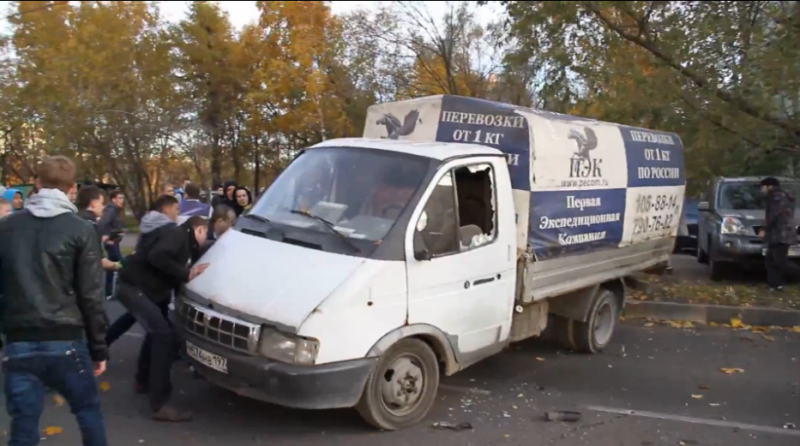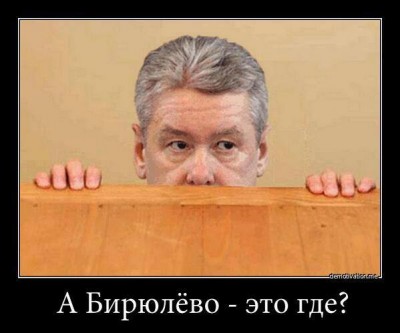
Rioters tipping over a delivery truck in Western Biryulyovo during recent unrest in the Moscow neighborhood. YouTube screenshot.
A poverty-stricken industrial Moscow neighborhood has erupted in ethnic violence last week, after a local man named Egor Sherbakov was stabbed to death while walking home with his girlfriend by someone described as “not a Russian citizen.” Residents of Western Biryulyovo began to gather on Saturday, demanding that local police to apprehend the killer. Initially, the protest was relatively peaceful, but by Sunday afternoon it had turned aggressive, as rioters began targeting migrant workers from Central Asia and their property. Particularly, a local vegetable warehouse (the largest in Moscow), was singled out as a place that employs thousands of illegal migrants. Police from all of Moscow have been brought into the neighborhood to pacify the situation. By the end of Sunday night hundreds of people were arrested.
The response from the Russian blogosphere mainly came in two flavors. As Novosibirsk university lecturer Sergey Schmidt noted [ru], those opposing the government see the riots as proof of what the country has come to with the “crooks and thieves” in power, while those who support the Kremlin argued that the riots show what Russia would look like without a strong leader.
Pro-Kremlin newspaper editor Ashot Gabrelyanov, for example, argued the latter point:
Ситуация в Бирюлеве в очередной раз доказала, что России нужен жесткий царь и жесточайшая диктатура.
— Ashot Gabrelyanov (@gabrelyanov) October 14, 2013
The situation in Biryulyovo has once again proved that Russia needs a harsh Tsar and the most severe dictatorship.
Anti-Kremlin nationalists like Egor Kholmogorov have, as usual, tried tried to exploit the ethnic violence to promote their cause. Kholmogorov wrote [ru] an article titled “We are not vegetables,” where he blamed the grocery warehouse run by migrants for the current violence, calling it a “chancre” and a nest of “criminality” in the region. His solution for “ethnic crime” is simple: a visa regime with Central Asia and the Caucasus, and “zero tolerance for criminal actions of migrants.”

“Where's Biryulyovo?” asks a scared Sergey Sobyanin, Moscow's mayor, in a recent demotivator. Anonymous image distributed online.
Others, like the blogger colonelcassad, also see [ru] this “pogrom” as yet another in a long line of flare-ups over migration, despairing that anything would change as a result:
через несколько дней ситуация информационно сойдет на нет, до следующего взрыва аналогичного содержания ибо нет совершенно никаких предпосылок к устранению тех тенденций, которые приводят к систематическому повторению одного и того же сценария.
after a few days the informational coverage of the situation will diminish to nothing, until the next, similar, explosion because there is absolutely no reason to eliminate the trends that lead to the systematic repetition of this same scenario.
Some might disagree — in an interview [ru] on the internet TV channel TV-Rain, human rights activist Svetlana Gannushkina of Memorial blamed the anti-migrant rhetoric of the September Moscow mayoral election for inciting the violence:
Ответственными за все делаются мигранты, хотя никаких доказательств пока нет. Если мы сейчас опять слышим разговоры о визах для жителей Центральной Азии, хотя вообще непонятно, оттуда ли он (убийца Егора Щербакова. – Ред.).
Migrants are being made responsible for everything, although there is still no evidence for it. If we once again see discussions about a visa regime for residents of Central Asia, although it is not clear at all if he (the killer of Yegor Sherbakov – ed.) was from there.
Internet guru Anton Nosik also thought that someone was to blame for inciting the race riot, but for him it was the Kremlin. Nosik reminded [ru] his readers of the pogroms that were so frequent 100 years ago, towards the end of the Russian empire:
Поэтому все погромы, которые тут случаются — или случались сто лет назад — так или иначе связаны с попытками власти решать свои проблемы за счёт иноверцев и инородцев, направляя в их сторону народный гнев. Опыт Николая II подсказывает, что пользы от этих попыток нет ни малейшей, а расплата за них запредельно дорога.
That is why all the pogroms, which happen here — or happened 100 years ago — in one way or another are connected with attempts by the government to solve its problems at the expense of other religions and foreigners, directing popular anger toward them. The experience of Nicholas II suggests that these efforts have no benefit, and the price paid for them is prohibitively expensive.
While Nosik thinks that the Kremlin is pulling a fast one by distracting people from their own corruption by encouraging nationalist tendencies, blogger russkiy_malchik manages to keep a brighter outlook [ru]:
Проблема межнациональных отношений в стране и в столице особенно – созрела и дошла до той кондиции, когда её хотят решать и власть, и общество.
The problem of inter-ethnic relations in the country, and especially in the capital, has reached the stage when both the government and society want to solve it.








3 comments